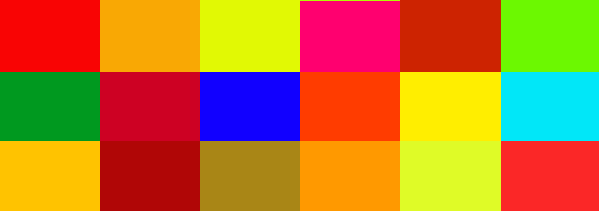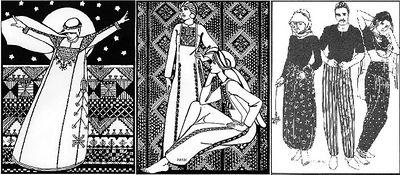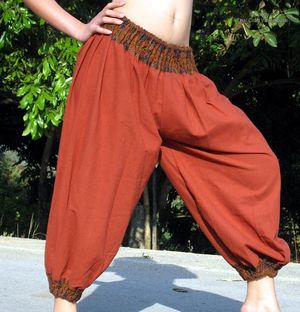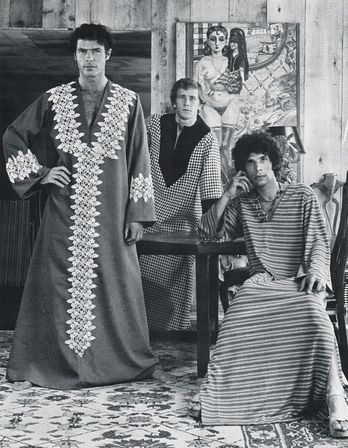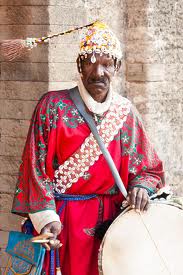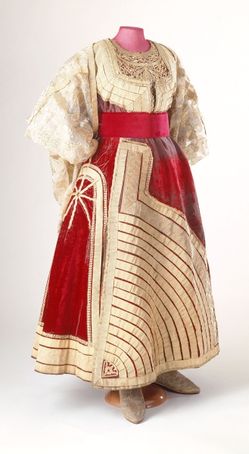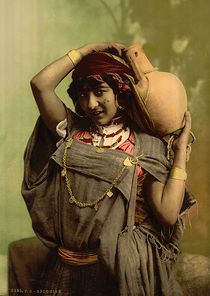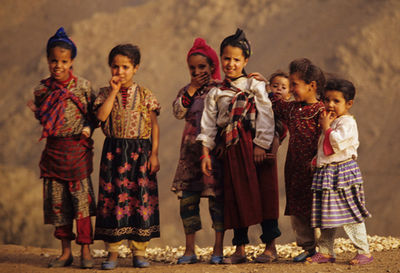The Brass Coast costumes
mNo edit summary |
m (inclusive language) |
||
| Line 23: | Line 23: | ||
==Making Guides and Examples== | ==Making Guides and Examples== | ||
Folkwear make a range of patterns for North African and Arab style garments which are all perfect for the Brass Coast, for | Folkwear make a range of patterns for North African and Arab style garments which are all perfect for the Brass Coast, for people of any gender. | ||
*[https://www.folkwear.com/products/gaza-dress?variant=34353684622 Pattern 101 Gaza Dress] | *[https://www.folkwear.com/products/gaza-dress?variant=34353684622 Pattern 101 Gaza Dress] | ||
*[https://www.folkwear.com/products/egyptian-shirt?variant=34362136334 Pattern 104 Egyptian Shirt] | *[https://www.folkwear.com/products/egyptian-shirt?variant=34362136334 Pattern 104 Egyptian Shirt] | ||
Latest revision as of 22:39, 26 May 2023
Overview
This page aims to offer help in creating a Brass Coast costume for those who want it. It provides a list of resources that players looking to create a costume, either purchasing one or making one may find useful. There is no one way to create the perfect costume, but the suggestions on this page will help to produce a great costume for Empire.
The Brass Coast offers a chance to create some flamboyant and really expressive costumes. The Freeborn attitude to life is all about individuality, passion and luxury, and many Freeborn express this through their dress. Success is measured in wealth, and what better way to demonstrate that wealth than by wearing it openly? The Freeborn look is usually one of bright colours, silks, jewels and sumptuousness. Individual style is highly valued and the mundane and common scorned. The Brass Coast lives for dance and music, and the clothing worn there often reflects this. With the flame being the central symbol for the Freeborn, it’s no surprise to find that their clothing is made in brightly coloured layers to convey the impression of the fire within.
Colour Guide
The colour palette is inspired by flame, but it also features other sumptuous colours -such as turquoise, magenta, emerald green and peacock blue. Note the absence of black - reserved for the dead and white - worn only by the very poorest.
10 Quick Tips
- Generally, an outfit is likely to consist of trousers, top, a robe of some sort and a headdress.
- A great way to achieve the richness and the movement in Freeborn style is through costume in multiple layers - working from heavier warm layers as a base and floating fabrics as a top layer.
- To cope with the British climate, fleeces are ideal as linings for more flamboyant fabrics, and light wools can be dressed with metallic brocades or embroidery. Multiple layers of silks are also surprisingly effective at keeping out the cold.
- Bright colours layered together can give a wonderful range of shades which alter as the wearer moves - or ‘shot’ fabrics, also called ‘changeant’ can look incredible in flowing robes, scarves and skirts.
- Whilst the style and clothing inspirations are Moorish and North African, the colours, beading and embroidery of sari and other fabrics widely available in Asian clothing shops across the UK so these can be a great source of materials. Shalwar Kameez can be a useful base layer.
- Both charity shops and on-line stores can be good sources of Arabic and North African loose tunics and trousers - often in white cotton which will dye well in bright colours.
- To really keep the flowing feel of Freeborn style, try avoiding heavy belts and instead secure layers of clothing with scarves; hanging pouches and scabbards from the shoulder on cords or jewelled chains.
- Integrating the flow of jewellery with the flow of the costume is another strong marker of the Brass Coast, and internet suppliers of belly dancing costume, as well as markets and shops near Asian areas, can be a good place to find long strings of coins, bells and other adornments.
- Try Asian shops for slipper shoes, or look for patterns for making Greek or Roman sandals which lace up the leg - both are common footwear for the Freeborn
- If all this talk of silks and brocades is sounding a little pricey - check out the fabric pages to see how impressive effects can be achieved without spending a fortune
Making Guides and Examples
Folkwear make a range of patterns for North African and Arab style garments which are all perfect for the Brass Coast, for people of any gender.
- Pattern 101 Gaza Dress
- Pattern 104 Egyptian Shirt
- Pattern 105 Syrian Dress
- Pattern 106 Turkish Coat
- Pattern 107 Afgan Nomad Dress
- Pattern 108 Turkish Dancer
- Pattern 119 Sarouelles (Trousers)
- Pattern 132 Moroccan Burnoose
To create loose and flowing trousers any of these patterns work well. Variation can be added by ending the trousers just past the knee or by slitting the leg to reveal jewellery or another layer of colour.
A simple T-tunic will work well in the Brass Coast, with Freeborn touches achieved by adding decoration, particularly around the neck and keeping this base slim fitting so other layers can flow over it.
There are several different styles of long robe which work well for over layers. This garment is based on either the traditional kaftan, or the thobe. To give it strong Freeborn flavour the colours would be bright and slits to knee or hip would reveal layers beneath.
A more dress-like version of the tunic is the anarkali suit, which is a high waisted dress with a full skirt to knee or calf, worn over trousers. A similar garment from Morocco is called the el-keswa.
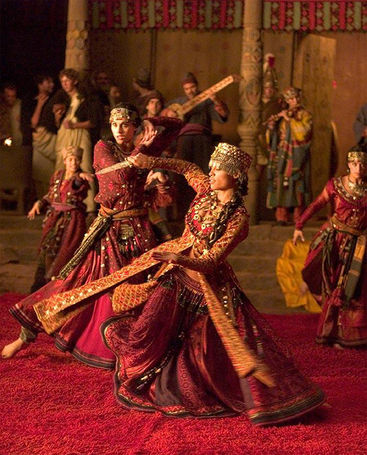
A melia is a traditional Tunisian dress/robe, which is simply fabric pinned at the shoulders and either left hanging or be belted to the body, much like a Roman Stola. The Freeborn are likely to wear it over tunic style top and trousers rather than on its own.
Waistcoats and open robes are another possibility to layer over a tunic, or even a over a first robe adding yet more colour and decoration.
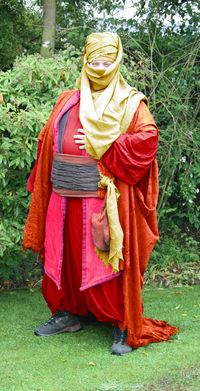
Headwear
The perfect Brass Coast headdress is the tagelmust. Red, orange, or yellow are ideal for the Brass Coast. Tagelmusts in the indigo-dyed shades worn by the Tuareg people in the real world are inappropriate at Empire, due to their actual cultural significance.
How to tie a tagelmust video
Children
Children are an opportunity for parents to show off their wealth, dressing their offspring in traditional Freeborn styles. Children in the Brass Coast are often dressed in scaled down versions of their parents clothes.
For toddlers and babies, simple t-tunics and drawstring trousers are simple and easy to pull-on garments, that can be made in linen or cotton for easy washing! These types of clothes also have plenty of flexibility in terms of size, meaning they should last for more than one year. Choosing sleeveless and none form fitted top layers like the melia/stola should make several years of wear possible, making fancy trims and embellishments worthwhile.
General tips for costume for children:
- Robes that stop at knee - mid-calf will be less of a trip hazard
- Headgear that can be very simply retied is great
- Avoiding things that can pull around the neck is wise (strings on cloaks/hats on cords/ tabards that don't secure under the arms
- Wider neck holes, sleeves and armholes will help with getting costume on and off, and leave room for growth
- Patterns for medieval children's clothes
- Revival Clothing's premade items for children
- Gambeson's premade items for children
Suppliers
Costume
- The Midgard Seamstress Custom made UK LARP and Re-enactment costumes
Armour
- Darkblade has cool leather scale for the Brass Coast.
- Idiom Productions Costume and props workshop creates custom hand-tooled leather armour, clothing and LRP weapons.
- Totally Leathered provides custom tooled leatherwork & bespoke armour.
Chain mail supplies and finished items:
Lightweight polyurethane replicas:
Make your own:
- How to make leather scale armour the easy way!
- And here's one on how to make plate out of wonderflex, ideal for Mage armour
Inspiration
The following sections pull together some of the research done by the art department team working on The Brass Coast - feel free to delve in deep as you like
Pinterest Sites
Films, TV and Costume Pages
- The Last Legion
- Kingdom of Heaven (cosplay details for Sybilla available here)
- Prince of Persia
- Sinbad
- Also, look at the Medjai from The Mummy (cosplay details available here.)
- Roxanne's dance from the movie Alexander
Further Bibliography and Resources
- Berber Costumes of Morocco, Marie-Rose Rabate
- The Moors: The Islamic West 7th-15th Centuries AD David Nicolle
Further Reading
Core Brief
Additional Information
